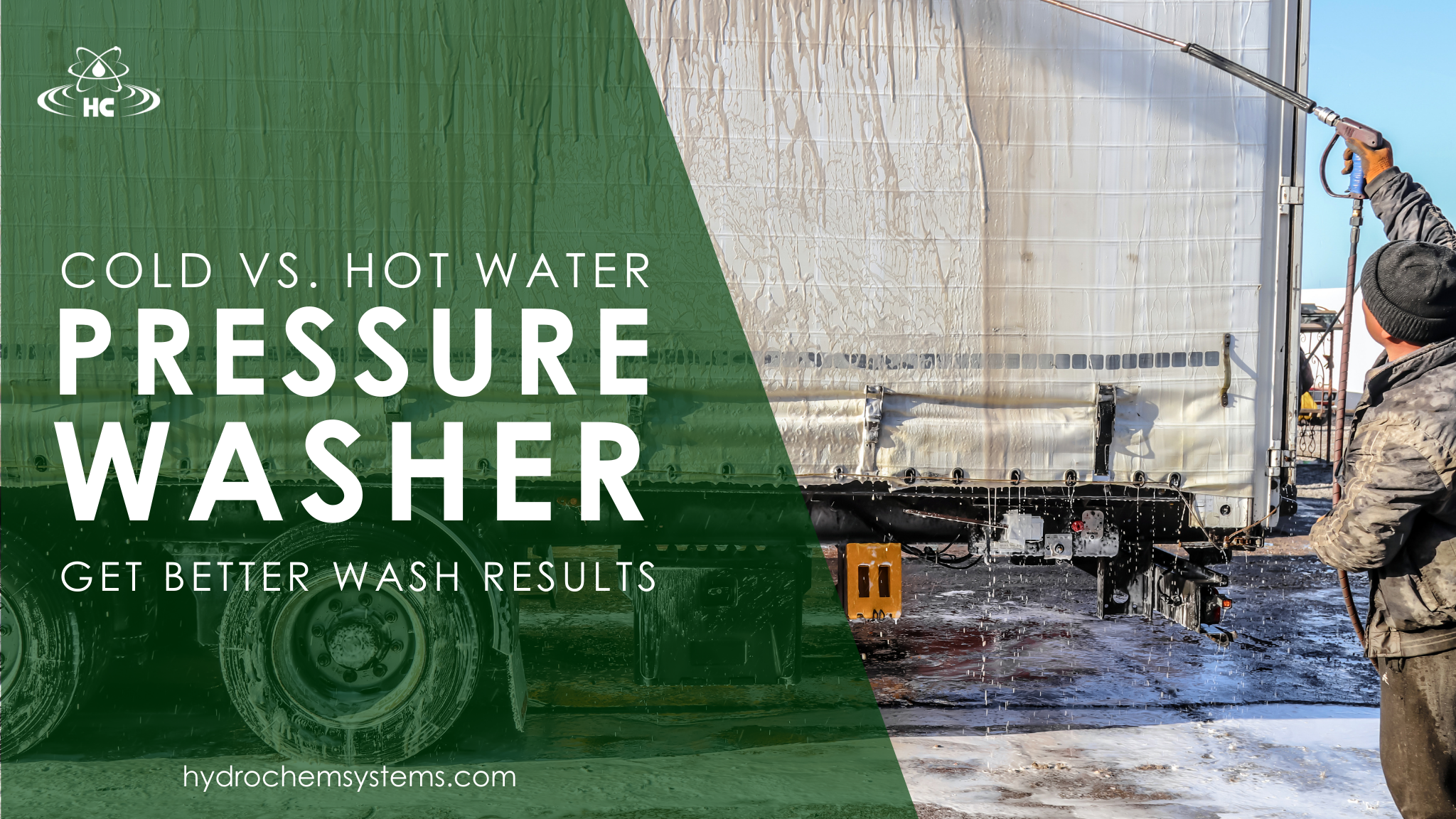Cold Water vs. Hot Water Pressure Washer: How to Get Better Fleet Washing Results

It's 6 a.m. You're pulling into the fleet yard for another day of washing. Your hot water washer fires up with that familiar rumble, steam rising in the cold morning air.
In the back of your mind, you're wondering if there's something you're missing. Is there a better way to use this equipment? A technique that could give you faster washes and better results?
There are so many moving parts. Water pressure. Flow rates. Soap selection and dilution ratios. You know temperature matters, but are you using it right?
The simplest adjustment can give you faster washes and better results. Make sure you're using water temperature to your benefit.
The Key to Better Results with a Hot Water Pressure Washer:
100-130 °F
The honest truth? You don't need a hot water pressure washer. Plenty of mobile washers deliver excellent work with cold water. But if you wash fleets regularly, operate in harsh climates, or frequently tackle grease and oil, a hot water pressure washer provides a competitive advantage.
On the job, most mobile washers operate their water too hot or too cold. In reality, you want it warm. Not scalding, not lukewarm. Warm. The optimal temperature is 100-130 °F. That's warm to the touch, but not burning hot.
This temperature range delivers three benefits for you. It accelerates how fast your detergents work. It breaks down grease, oil, and road grime faster than cold water. And it accomplishes this without damaging the surfaces you're cleaning.
Stay in this range, and you'll wash faster, use less chemical, and achieve better results on the first pass.
What This Does for Your Bottom Line
When you dial in that 100-130 °F range, you see improvements across everything you do.
You save time. Approximately 15 minutes per hour of cleaning. That's almost a complete extra wash every four hours. More washes per day translates to more money in your pocket.
You use fewer chemicals. Consume roughly 25% less detergent per wash, or you can dilute further and still achieve the same results. Over hundreds of washes, that accumulates into significant savings.
You use less water. Approximately 25% less because warm water cleans better. You don't require as many passes or as much rinsing.
You get better results. Less rework. Fewer spots you need to address twice. Cleaner trucks on the first pass. Customers notice the difference.
These are conservative estimates. Even if you only see a 15-20% improvement, that's substantial. The cold water vs. hot water pressure washer debate comes down to these numbers: if you're completing five washes a day and warm water enables you to do six, that's 20% more revenue with less cost and happier customers.
Cold Water vs. Hot Water Pressure Washer: Why Temperature Makes or Breaks Your Results
There is real science behind using warm water because heat accelerates chemical reactions. When you're using detergents, warm water helps them work faster. Contaminants like grease, oil, and road grime have a breaking point where they begin to dissolve and separate. Warm water gets you there faster.
But excessive heat causes different problems. Water above 140 °F begins breaking down detergent molecules, and your soap becomes less effective. In cold weather, a hot water pressure washer running too hot can flash freeze when water contacts cold surfaces. It can also damage paint, vinyl graphics, and protective coatings.
Cold water decelerates everything. Your detergent requires longer to work. Cold surfaces make cleaning more difficult. You end up consuming more product or investing more time on each vehicle.
That 100-130°F range is where everything operates in your favor. Detergents perform at their best. Cleaning reactions accelerate. And you avoid damage to surfaces or your equipment.
Winter Washing: When Warm Water Matters Most
Winter is where warm water demonstrates its value. Road salt and winter grime come off much more easily. Cold surfaces that would slow down your washing with cold water become manageable.
But look out for flash freezing. If your water temperature is excessive and the air is very cold, water can freeze almost instantly. Maintain that 100-130 °F range. It's warm enough to clean without creating ice problems.
Getting Better Results Starting Today
You're the one out there performing the work. Discovering ways to wash faster, cleaner, and more efficiently. Satisfying your customers and building your business.
Water temperature is one tool that helps you accomplish that better. Establish that temperature range and monitor your results. See what patterns emerge when you track your time per wash, your chemical usage, and your water consumption.
At Hydro-Chem Systems, we've been helping mobile washers and fleet managers optimize their washing processes for over 50 years. If you have questions about maximizing your equipment or which chemicals work best at different temperatures, we're here to assist.
When your objective is better results, warm water helps you achieve them.